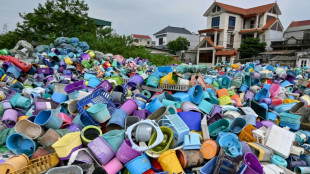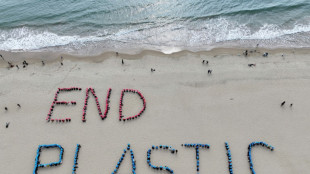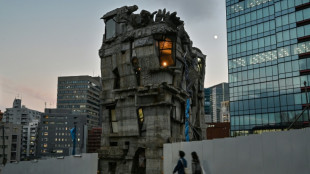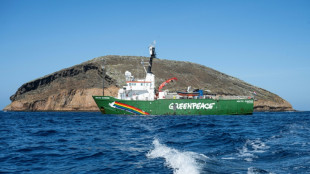
-
 Environmentalists slam lobbyist influence on plastic talks
Environmentalists slam lobbyist influence on plastic talks
-
Global security hotspots awaiting Trump in 2025

-
 Eddie Jones tells Japan to keep faith after heavy defeats
Eddie Jones tells Japan to keep faith after heavy defeats
-
Five forgotten conflicts of 2024

-
 Adani Group says it lost nearly $55 bn as US charges sparked rout
Adani Group says it lost nearly $55 bn as US charges sparked rout
-
Bumper election year brings headwinds for liberal democracies

-
 New Zealand pace bowler Smith to make debut in first England Test
New Zealand pace bowler Smith to make debut in first England Test
-
Protesters for jailed ex-PM Khan cleared from Pakistan capital's centre

-
 'Very, very slow': plastic treaty talks grind forward
'Very, very slow': plastic treaty talks grind forward
-
Australian cop guilty of manslaughter after tasering 95-year-old

-
 Trump names trade envoy, top economic advisor to fill policy team
Trump names trade envoy, top economic advisor to fill policy team
-
China expected to hit peak coal consumption in 2025: report

-
 What to expect from the new EU top team's first 100 days
What to expect from the new EU top team's first 100 days
-
New EU commission to get all clear as daunting task awaits

-
 German family winery taps into zero-alcohol trend
German family winery taps into zero-alcohol trend
-
World leaders react to Lebanon war ceasefire

-
 Paddington: the affable bear who became a lucrative business
Paddington: the affable bear who became a lucrative business
-
Hand-built fantasy tower brings value to Tokyo, creator says

-
 Asian markets mixed as traders eye fresh trade tensions
Asian markets mixed as traders eye fresh trade tensions
-
Ceasefire begins in Israel-Hezbollah war

-
 Banned Ryan Garcia eyes New Year's Eve exhibition in Japan
Banned Ryan Garcia eyes New Year's Eve exhibition in Japan
-
In US, a guitar trademark feud gets political

-
 China investigates defence minister for corruption: report
China investigates defence minister for corruption: report
-
'American Railroad' musical project showcases untold immigrant stories

-
 Future of deep-sea mining stands at a crucial juncture
Future of deep-sea mining stands at a crucial juncture
-
Australia marks 10 years since death of cricketer Phillip Hughes

-
 Russia accuses UK diplomat of spying in fresh diplomatic spat
Russia accuses UK diplomat of spying in fresh diplomatic spat
-
Teen who lied about beheaded French teacher's class says 'sorry'

-
 Drake takes Kendrick Lamar rap feud to US courts
Drake takes Kendrick Lamar rap feud to US courts
-
Bolivia announces $1 bn deal with China to build lithium plants

-
 NFL-best Chiefs and Lions face short-rest US holiday test
NFL-best Chiefs and Lions face short-rest US holiday test
-
Alleged smuggler had meth-soaked cow onesie in suitcase: US officials

-
 Man City blow three-goal lead in Champions League, Bayern beat PSG
Man City blow three-goal lead in Champions League, Bayern beat PSG
-
Arsenal deliver Champions League statement of intent: Arteta

-
 Man City not 'stable', says Guardiola after Feyenoord collapse
Man City not 'stable', says Guardiola after Feyenoord collapse
-
League fines Hawks $100,000 for Young missing NBA Cup game

-
 Man City blow 3-0 lead to extend winless run in Feyenoord thriller
Man City blow 3-0 lead to extend winless run in Feyenoord thriller
-
Kim heads Bayern past 10-man PSG to dent Champions League hopes

-
 Lewandowski hits Champions League century as Barca beat Brest
Lewandowski hits Champions League century as Barca beat Brest
-
Inter take Champions League lead with narrow win over Leipzig

-
 Arsenal crush Sporting in Champions League to extend revival
Arsenal crush Sporting in Champions League to extend revival
-
Ceasefire in Israel-Hezbollah war to take effect

-
 Egyptian clubs go on scoring sprees in CAF Champions League
Egyptian clubs go on scoring sprees in CAF Champions League
-
Biden hails Lebanon ceasefire deal as 'good news'

-
 Brazil's Bolsonaro 'participated' in 2022 coup plot against Lula: police
Brazil's Bolsonaro 'participated' in 2022 coup plot against Lula: police
-
Barcelona striker Lewandowski scores 100th Champions League goal

-
 Autos, food: What are the risks from Trump's tariff threat?
Autos, food: What are the risks from Trump's tariff threat?
-
Alvarez, Correa net braces as Atletico thrash Sparta Prague

-
 Trump brings back government by social media
Trump brings back government by social media
-
Animal rights activist on FBI 'most wanted terrorist' list arrested

| SCS | -1.33% | 13.54 | $ | |
| NGG | -0.68% | 62.83 | $ | |
| BCC | -2.76% | 148.41 | $ | |
| RIO | -1.53% | 62.03 | $ | |
| CMSC | -0.65% | 24.57 | $ | |
| AZN | -0.06% | 66.36 | $ | |
| CMSD | -0.61% | 24.43 | $ | |
| RBGPF | 100% | 60.1 | $ | |
| BTI | 1.01% | 37.71 | $ | |
| JRI | -0.98% | 13.24 | $ | |
| GSK | -0.38% | 34.02 | $ | |
| RYCEF | -0.29% | 6.78 | $ | |
| BCE | -1.46% | 26.63 | $ | |
| RELX | 0.51% | 46.81 | $ | |
| VOD | -0.56% | 8.86 | $ | |
| BP | -1.24% | 28.96 | $ |

German family winery taps into zero-alcohol trend
Alcohol-free drinks are becoming ever more popular, especially with health-conscious younger people -- a trend cheered by a small German winery based in a Rhine Valley castle.
While demand for zero-alcohol beer has risen strongly, the family business is betting on similar growth in the wine sector, using a technique it pioneered more than a century ago.
"We are seeing this growth in demand and it's going strong," said Bernhard Jung, who runs the Carl Jung wine estate based in the picturesque town of Ruedesheim.
Germany -- better known for its storied beer-brewing tradition -- may seem an unlikely place for the alcohol-free wine industry to flourish, but the Jung family had a head start.
Back in 1907, Bernhard Jung's grandfather Dr Carl Jung invented a process to gently extract alcohol from wine while preserving the original taste.
The winemaker hit on the idea when he risked losing a loyal customer who had to stop drinking alcohol for health reasons, and went on to patent the system which set the industry standard.
From its base in a small castle set amid vine-covered hills, the business has been making alcohol-free wine ever since, and three decades ago stopped producing alcoholic varieties altogether.
Jung said the company now produces about 17 million bottles of alcohol-free wine a year, with sales up by around 35 percent annually.
There have long been markets for "zero" drinks, including many Muslim countries, and also in earlier times, during the United States' 1920-33 Prohibition era.
But recent years have seen a growing popular thirst for non-alcoholic varieties of beer, wine and even gin from consumers eager to avoid health impacts and hangovers.
- Shifting attitudes -
That trend is bound to continue, says beverage data and analysis firm IWSR, which sees the highest volume growth in the United States, at 11 percent annually until 2028, and substantial increases in Britain, France and Germany.
The shift in attitudes has been especially pronounced among younger consumers, and comes as studies have contradicted popular views about the supposed benefits of drinking in moderation.
The World Health Organization disappointed many when it concluded last year that "when it comes to alcohol consumption, there is no safe amount that does not affect health".
Nowadays around two-thirds of the wine the Carl Jung winery processes comes from other businesses that want to offer alcohol-free vintages without investing in pricey equipment.
Tanker trucks arrive frequently from across Germany and Europe to have the alcohol removed from their wine varieties.
In a large room, two metal contraptions hooked up to pipes rumble day and night as batches of red and white tipple flow through them.
The liquid is heated up in a vacuum, meaning the alcohol evaporates off at a lower temperature than usual, helping preserve much of its original character.
It also undergoes an "aroma recovery" process that seeks to restore some of the character lost during the de-alcoholisation process.
- Convincing sceptics -
Critics love to dismiss alcohol-free wines as "grape juice" or worse, but Jung insists that "now we have better wines for de-alcoholisation than we used to get years ago".
"The know-how is also getting better."
At a bar in Frankfurt, Die Bruecke, owner Sandra Beimfohr said many customers agree and opt for alcohol-free whites and roses.
"We started offering it about four years ago, and at that time the guests were still hesitant. But now there is active demand -- in the last two or three years it has increased more and more."
For now, alcohol-free wine still has a long way to go -- it currently makes up just 0.5 percent of the global market for still and sparkling wines, according to IWSR data.
Jung conceded that the industry still needed to win "more respect from new customer groups", especially sworn connoisseurs of traditional plonk.
Alcohol-free wines also generally cost more than regular labels.
And for some, there will never be any substitute for the real thing.
Baerbel Buchwald, a customer in Die Bruecke, said that when she tried alcohol-free wine she found it "too sweet" and "very artificial".
"It didn't really taste like wine," scoffed the 67-year-old pensioner. "It tasted like cleaning detergent."
J.V.Jacinto--PC
